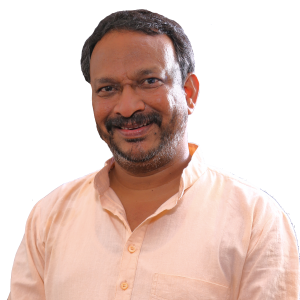Manual scavenging is blight on humanity in India. Consigned by structural inequality to the dalits, India’s “untouchables,” manual scavenging is the work of removing by hand human excrement from dry latrines and carrying on the head the baskets of excrement to designated disposal sites. A hereditary occupation, manual scavenging involves 180,000 dalit households cleaning the 790,000 public and private dry latrines across India; 98 percent of scavengers are meagerly paid women and girls. While the Constitution and other laws prohibit dry latrines and the employment of manual scavengers, these have not been strictly enforced since government itself is the biggest violator.
Bezwada Wilson was born to a dalit family in Kolar Gold Fields township in Karnataka state. Although his family had been engaged in manual scavenging for generations, he was spared the labor to be the first in his family to pursue a higher education. Treated as an outcast in school and acutely aware of his family’s lot, Bezwada was filled with great anger; but he would later channel this anger to a crusade to eradicate manual scavenging.
He started by changing the mindsets of his family and relatives – that being a dalit is not their fate but a status imposed by how society has been organized, and that no human being should be made to do such demeaning work as scavenging. In 1986, he sent a complaint about dry latrines to the authorities of their town, and when he was ignored sent the complaint to the Prime Minister, threatening legal action. As a result, the town’s dry latrines were converted into water-seal latrines and the scavengers transferred to non-scavenging jobs.
He boldly moved his crusade to other states, working with dalit activists, recruiting volunteers for what would take shape as a people’s movement of manual scavengers and their children, Safai Karmachari Andolan (SKA). With Bezwada Wilson as national convenor, SKA was launched in 1993 when he initiated the filing of a public interest litigation (PIL) case in India’s Supreme Court, naming all states, union territories, and the government departments of Railways, Defense, Judiciary, and Education as violators of the 1993 Prohibition Act banning dry latrines and the employment of manual scavengers.
SKA vigorously conducted district-level meetings to raise awareness about scavenging, the caste system, and the 1993 Prohibition Act, and trained local leaders and volunteers for the movement. In 2004-2005, it undertook a mass latrine demolition drive across the state of Andhra Pradesh; exposed the occupational violence faced by female scavengers; and met with officials to demand the demolition of dry latrines and the provision of alternative occupations for scavengers. In 2010, SKA led an India-wide march for the total eradication of scavenging, and again in 2015 undertook a 125-day bus journey across 30 states to mobilize the public against manual scavenging. The movement has since made significant progress. In 2013 SKA successfully lobbied for a new law that includes rehabilitation support for scavengers. It lobbied with local authorities for scholarships for children of manual scavengers, and conducted vocational training for scavengers’ daughters to move them into more decent jobs. It is now involved in crafting a new law that provides financial aid for scavengers transitioning to new occupations.
Fifty years old, Bezwada Wilson has spent 32 years on his crusade, leading not only with a sense of moral outrage but also with remarkable skills in mass organizing, and working within India’s complex legal system. SKA has grown into a network of 7,000 members in 500 districts across the country. Of the estimated 600,000 scavengers in India, SKA has liberated around 300,000. While Bezwada has placed at the core of his work the dalits’ self-emancipation, he stresses that manual scavenging is not a sectarian problem: “You are addressing all members of society, because no human being should be subjected to this inhuman practice.” Society itself has to be transformed.
In electing Bezwada Wilson to receive the 2016 Ramon Magsaysay Award, the board of trustees recognizes his moral energy and prodigious skill in leading a grassroots movement to eradicate the degrading servitude of manual scavenging in India, reclaiming for the dalits the human dignity that is their natural birthright.










